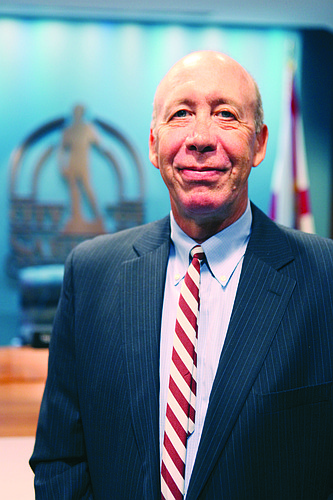- April 30, 2024
-
-
Loading

Loading

As officials continue to grapple with the region’s homelessness issue, city leaders have pointed to a state-approved taxing option as a potential tool to fund mental health programs in Sarasota.
A state statute stipulates that, if a majority of the voters approve, a county can create a special taxing district for mental health care. The provision has seen little use: Just one county, Hardee, has followed through with that option.
That may provide some guidance should officials pursue that path, but even then, the situations are markedly different. Hardee County Manager Lex Albritton said the district was approved to fund indigent health care as the county hospital struggled to stay open.
“It’s a minimal millage rate,” Albritton said. “Citizens don’t pay a whole lot of attention to it. If it was something that had to be re-established, I wouldn’t be so surprised if they had to eliminate it all together.”
City Manager Tom Barwin isn’t deterred by the lack of precedent. He’s repeatedly called the lack of mental health care a major contributor to the homeless problem.
“There needs to be additional facilities and beds for crisis treatments beyond two or three days,” Barwin said. “That seems to be a huge priority, and a consensus for that, I believe, is out there.”
In February, county officials took issue with a city press release suggesting the issue could be raised on the November ballot.
Today, county officials still aren’t actively exploring the possibility of creating a new funding stream for homelessness services. This, too, does not deter Barwin, who cites former County Administrator Jim Ley as a leading advocate for the mental health district.
On the city’s end, Barwin said the concept will see additional vetting, holding out hope the county will revisit the idea after November’s election.
“We will be roughing out some concepts,” Barwin said. “Then, I hope, we’ll be experiencing the county’s wisdom on the subject.”
The city of Sarasota’s quest to establish a housing first program took another blow last week, when Gov. Rick Scott announced his intention to veto $250,000 in state funding toward that effort.
In the wake of that decision, City Manager Tom Barwin expressed his frustration, stating that officials were not recognizing the severity of the homelessness problem.
“The issue in Florida, and really in many part of the United States, is building to crisis levels,” Barwin said. “We haven’t seen people living on the streets in tents in American cities at this level at any time since the Great Depression.”
The item was vetoed along with a series of projects that “circumvent current established grant review processes, or funding is available through other sources,” according to a release from the governor’s office.
Barwin said the city is working with local agencies and citizens to help fill the gap created by the veto, touting a $1 million donation from an individual toward a future housing first program.
The state money was slated to go toward vouchers to place homeless individuals in existing housing units, because housing first prioritizes placing people in homes as quickly as possible. Barwin said the city would continue to look for areas to collaborate with the state, and said government funding could provide the foundation for a long-term project sustained by other donors.
“I guess my only response is to ask the rhetorical question: If this can be handled in other ways, why hasn’t it been?” Barwin said. “This is not a problem that’s just jumped up overnight. It’s been evolving and growing for a couple of decades in Florida.”